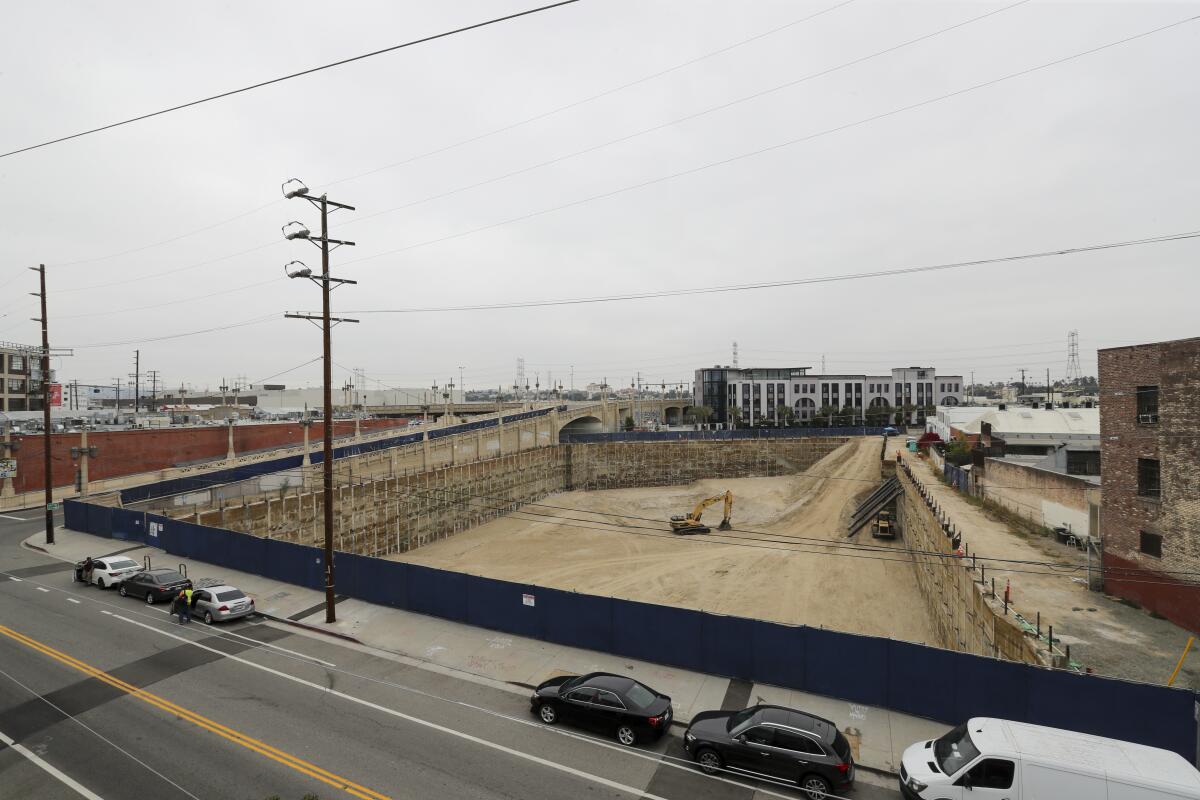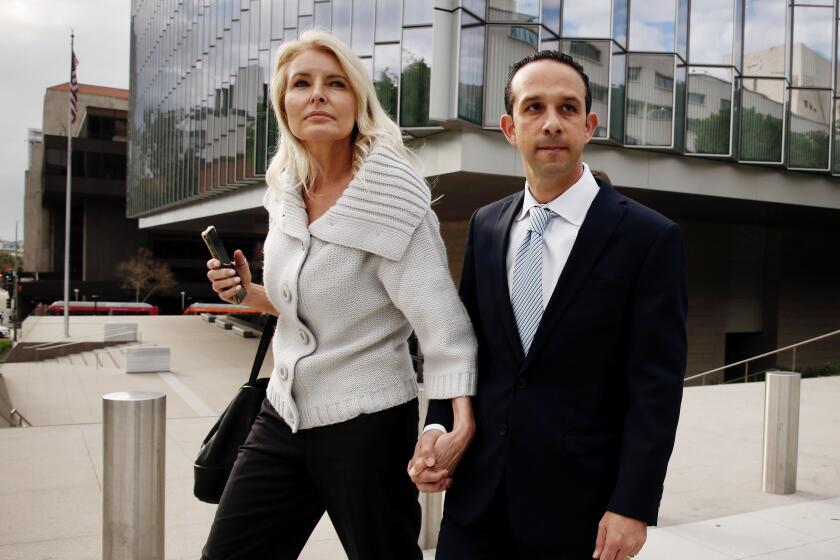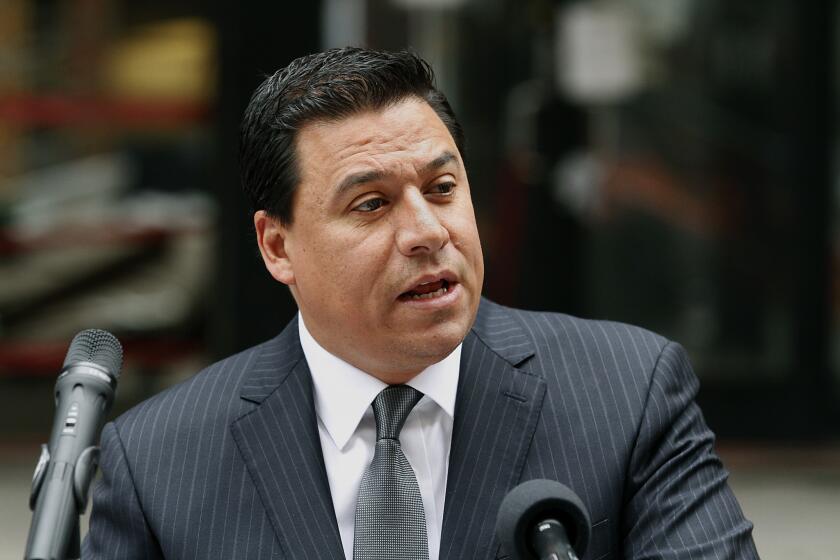Developers allegedly bribed an L.A. councilman. What happens to their building plans?

- Share via
Federal officials have charged Los Angeles City Councilman Jose Huizar in an ongoing pay-to-play probe, accusing him of running a criminal enterprise fueled by bribes from real estate developers seeking to build in his downtown district.
It is unclear, however, what might happen to the as-yet unbuilt skyscrapers planned by the executives who allegedly provided those bribes. Several council members have called for the city to reassess approvals for real estate projects mentioned in the criminal case, arguing that the building plans have been tainted by the scandal.
“I would be disgusted if we had to drive through downtown Los Angeles for generations and see buildings marking the city skyline that were achieved through bribery and corruption,” said Councilman Paul Krekorian, who has also proposed barring developers implicated in criminal conduct from getting any future approvals.
But the question of what the city should — or can — do to thwart such projects could hinge on a long list of factors, including how far along developers are in the building process, what kind of approvals they have obtained, and what can be proved about the alleged bribery in the federal case, according to land use attorneys interviewed by The Times.
The situation boggled some lawyers. “I’ve never seen anything like this,” said land use attorney C.J. Laffer.
As L.A. officials battle the coronavirus pandemic, a corruption scandal has fueled mistrust in City Hall.
Investigators have pinpointed at least four projects involved in the alleged bribery scheme, according to the criminal complaint against Huizar. Although prosecutors have not identified those projects or their developers by name, key details in the document make clear that they are scrutinizing:
• A 20-story residential tower planned at the corner of Hill Street and Olympic Boulevard.
• Plans to replace the Luxe City Center Hotel across from the L.A. Live entertainment complex with new towers.
• A 77-story skyscraper proposed for property occupied by the L.A. Grand Hotel Downtown on Figueroa Street.
• A 35-story tower being built in the Arts District.
None of the real estate developers mentioned in the criminal complaint have been arrested or publicly charged. The 77-story skyscraper has yet to get city approval; the other three have been approved but not yet completed. The furthest along is the Arts District tower, which started work this year to prepare the Mateo Street site.
L.A. has taken an initial step to obstruct one of those projects: In June, city officials said they would push to revoke approvals for alcoholic beverages and entertainment at the Luxe City Center Hotel. City Atty. Mike Feuer said it was necessary “to preserve transparency, fairness, and integrity” in city decisions, calling the project “the product of corruption.”
Blocking those approvals for alcohol and entertainment, however, would not otherwise stop the redevelopment project from moving forward. Other approvals for the Luxe project are still under review, according to city officials.
Rob Glushon, an attorney who represented neighbors suing over the Arts District project, said that legal deadlines to lodge new challenges over city approvals for the projects have probably passed. But one possibility, Glushon said, could be for the city attorney to sue the developers to invalidate the project approvals based on fraud.
“I’ve never seen that done,” Glushon said. “But it would send a powerful message to developers that they risk the loss of city approvals if they participate in criminal conduct.”
Environmental and land use attorney Mitchell Tsai likewise said the city could argue that “you secured these entitlements under false pretenses.” But “it really depends on the specific facts surrounding each development,” Tsai said.
Several attorneys said such cases could hinge on “vested rights,” which give California developers the right to complete a project even after government officials change the rules about what can be built.
One of the ways to gain such rights, under California law, is if a developer has spent a significant amount of money in “good faith reliance” on a permit issued by the government. The Huizar case could pose a question for the courts: Whether a real estate developer that has allegedly bribed an official can have “good faith reliance” on the resulting permit.
Builders can also gain vested rights by getting a kind of city approval that specifically provides them; the Arts District project obtained such an approval, according to the planning department.
Another route is entering into a development agreement for a project, attorneys said. Under such an agreement, a developer agrees to provide additional benefits for the community — such as funding for affordable housing or infrastructure improvements — in exchange for getting those vested rights for an extended period of time. The Luxe City Center Hotel project has such an agreement.
Council members want the city attorney to examine whether Government Code 1090, which prohibits officials from being “financially interested” in contracts they agree to, could void any development agreements.
William Fulton, founder and publisher of the California Planning and Development Report newsletter, said L.A.’s situation could test whether that law applies to development agreements. He pointed out that Santa Monica officials unraveled such an agreement six years ago in the face of community opposition to a planned project.
“There’s been a lot of debate about when an approval can be undone, but I don’t think it’s ever been tested in a bribery context,” Fulton said. If the courts decide against it, “I wouldn’t be surprised to see a state bill to address this.”
Another possible question, in court, is whether bribing one member of the City Council can invalidate an approval that was granted by the entire council. In Los Angeles, council members tend to defer to the official who represents the area where a building project is planned, but development decisions are ultimately voted on by the full council.
The alleged bribes mentioned in the criminal complaint against Huizar include $600,000 for a loan to help the councilman quietly settle a sexual harassment lawsuit; hundreds of thousands of dollars handed over in a paper bag; free flights on private jets, gambling chips and meals; and damaging information on former aides suing Huizar.
Developer Dae Yong Lee, whose company has pursued the Hill Street project, is cooperating with the investigation, according to his attorney, who said they “look forward to a swift resolution clearing his name.”
An attorney for Shenzhen Hazens, which got approval to redevelop the Luxe City Center Hotel, did not respond to a request for comment. The firm seeking to build the 77-story skyscraper, Shenzhen New World Group, could not be reached.
L.A. Mayor Eric Garcetti and City Council President Nury Martinez called on Councilman Jose Huizar to resign amid an ongoing federal investigation into a City Hall “pay-to-play” scandal. Huizar has not been charged.
And Carmel Partners, which pushed for the Arts District project, said it had put one of its executives on leave but said that members of its executive committees did not knowingly participate in any pay-to-play scheme involving Huizar.
Even if the four projects mentioned in the case had already been built, courts have sometimes taken action to invalidate permits or tear down buildings that are partly or fully constructed.
Perhaps the most infamous case is the Bel Air mega-mansion developed by Mohamed Hadid, who faced criminal charges and a civil lawsuit over a home that city officials said was far bigger than approved. In December, a judge ordered that the unfinished mansion be torn down to the slab, but Hadid has appealed, and the structure still stands.
In Hollywood, a legal battle over a new tower at Sunset Boulevard and Gordon Street led a judge to invalidate its construction permits, eventually forcing residents to move out. The City Council later voted to approve the project a second time.
Attorney Robert P. Silverstein, who represented the group that sued over the Sunset and Gordon project, argued that if the permits could be invalidated in that case, “why can’t that happen in the far more egregious situation of criminal fraud, bribery and corruption of public officials?” He argued that federal officials should pursue criminal and civil forfeiture proceedings against the building owners.
In the Arts District, a group of nearby residents sent a letter to Carmel Partners urging the firm to reassess its project on Mateo Street, “since its permitting and approval process was corrupt and unreliable.” Among their concerns are traffic and safety impacts and the height of the tower, which was slated to be the tallest building in the neighborhood when approved.
Residents have debated whether to urge the city to toss out its approvals entirely, amid concerns that such a demand could backfire, said Erica Berger, a resident of the nearby Molino Street Lofts.
Another group, the nonprofit Affordable Housing for Artists, argued that the project needed more affordable housing, saying that Huizar had “traded away” such housing in a “corrupt exchange for political contributions and other monetary considerations,” as alleged by federal prosecutors.
“If they want to continue that project, they should start from scratch,” its director Jonathan Jerald said.
Carmel Partners has argued that the project, including its share of affordable units, was shaped by community concerns and said its political contributions were not the reason it won approval.
Times staff writer David Zahniser contributed to this report.
More to Read
Sign up for Essential California
The most important California stories and recommendations in your inbox every morning.
You may occasionally receive promotional content from the Los Angeles Times.













